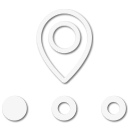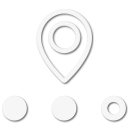
Enthusiast III
Well, there's a lot to all that. So let's break some of it down.
Bonding/Grounding: Things like the Gobi rack don't make bare metal to bare metal contact. They attach over painted surfaces and while they may show a DC current short, at RF frequencies you may have several thousand to a few million ohms of impedance. To keep any spare current you develop on the rack from grounding through the shield of your coax back to your radio (and possibly causing damage to the radio) you should use straps (1/4" to 1/2" wide is good start) from each leg with the paint removed between the contact points, and painted over to prevent corrosion after final install to the body and preferably the frame as well. Make sure you use flat strap and not just wire as the higher surface area of the strap lowers the impedance of the connection and makes it the more desirable path for stray RF.
I have my radio wired straight to the battery with a 40A circuit breaker, 40A solid state relay, and 4 position fuse block for future add ons. The relay is triggered by a 12V switched signal from one of my accessory ports in the Xterra. This has worked very well and could easily be set up to be triggered by your SPOD if you choose. But I run my radio 24/7/365 when driving. The only time it doesn't get used is when the wife drives the X for some reason and cuts it off. (is off when key off)
MARS/CAP is not legal unless you are a registered MARS member. So don't worry much about it right now.
As for the radio coming pre-programmed, that's understandable from someone coming from radio services with established channels and frequencies such as CB, FRS/GMRS or business licenses. However there's so much more to Ham and being able to program your radio on the fly and make changes in order to make contact are key to getting the most out of your radio. Buy a Nifty manual for your radio and spend some time getting used to using it. It's hard to help a radio user who's having trouble on the air if they don't know how to operate their radio.
I always recommend getting at least lightly involved in a local radio club if for nothing else than to have good help available when you have issues with gear or procedures. They can be a huge help and I've made lots of good friends in my local club as well as having a blast operating during events like Field Day and local QSO parties.
Thank you very much for the reply and the info! I will be going into full learning mode prior to the test!








